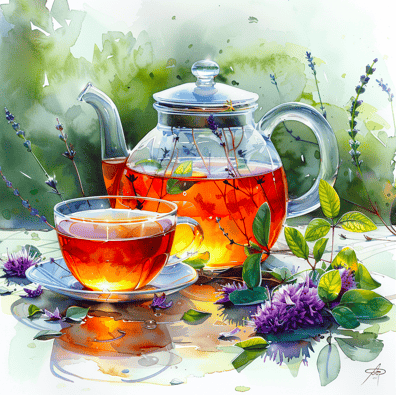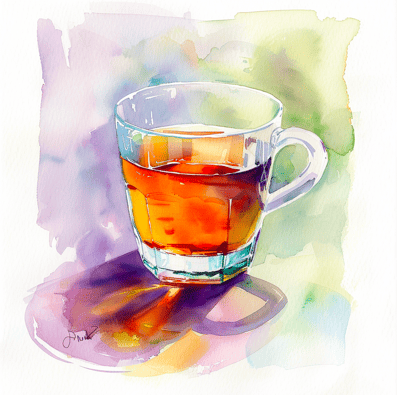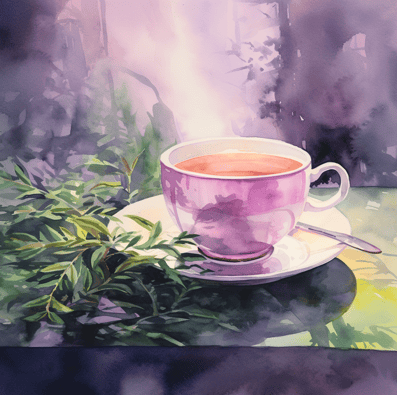
Can you oversteep tea? Absolutely. If you’ve ever made a cup of tea that tasted bitter or too strong, you might have oversteeped it. Understanding how to steep your tea correctly can make a big difference in taste and enjoyment. Would you also like to know the benefits of oversteeping? Keep scrolling.
Hi, I’m Hazel
I gave up on skincare after years of issues with acne and sensitive skin.
But after going plant-based, my skin cleared up and even started to glow. Now I help women reveal their natural beauty with simple, delicious plant-based food.
I also used to be a nurse, and love nerding out on nutritional science (high-quality science, that is).

As usual, this post is based on the strongest nutritional evidence I could find with a focus on the simplest, most delicious foods
…because who has time to waste on actions that don’t work?
The quick version:
Yes, oversteeping tea results in a bitter taste. However oversteeping can also enhance antioxidants in some teas, like green and white tea.

What is oversteeped tea?
Over-steeped tea happens when hot tea is left to steep for too long, causing it to become bitter and overly strong. This occurs because the prolonged steeping time allows more tannins, which are bitter compounds, to be released from the tea leaves.
How can you tell?

- Bitter Taste: The most obvious sign is a bitter, unpleasant taste.
- Dark Color: The tea may become much darker than usual.
- Strong Aroma: The tea might have a strong, overpowering aroma.
- Astringency: Oversteeped tea can leave a dry, puckering sensation in your mouth.
These signs indicate that your tea has steeped for too long, and adjusting the steeping time can help you avoid this issue in the future.
The problems with oversteeping tea
- Bitter Taste: Oversteeping tea can make it taste bitter and unpleasant. The longer tea steeps, the more tannins are released, causing bitterness.
- Increased Caffeine: Oversteeping increases caffeine content, which might be a concern if you’re sensitive to caffeine.
- Nutrient Loss: Oversteeping can lead to a loss of the delicate flavors and nutrients that make tea beneficial (1).
If you’re a tea enthusiast and want the best flavor, then oversteeping tea is not a good thing.
But there are also benefits
If you prioritise the beauty and skincare potential of tea, then best practice is to ‘oversteep’ your tea.
A longer steep time can increase the antioxidant properties of the tea, especially in green tea and white tea. For these teas, prolonged steeping in both hot and cold water can enhance their antioxidant levels (2).

You’ll also love:
How to Glow Up With Jasmine Green Tea Skin Secrets
However Black tea benefits most from shorter hot water infusions.
Another study found that the antioxidant activity of tea infusions increases with longer periods of steeping, particularly up to 15 minutes (3). This effect is consistent across different types of tea, including green, black, white, and herbal teas. The prolonged steeping allows more antioxidants to be released from the tea leaves into the infusion. For optimal antioxidant benefits, steeping tea for at least 15 minutes is recommended for most varieties.
If you prefer a robust and intense flavor, oversteeping can achieve that, especially with black or herbal teas.
Finally, for those needing an extra caffeine boost, oversteeping can provide a stronger kick, similar to coffee.
Tip: I find that I use hot water but not boiling in order to get the best of both worlds: antioxidant-rich tea that isn’t too bitter that is also steeped for a long time.
How to salvage bitter tea
Dilute with Hot Water
- Method: Add more hot water to the oversteeped tea.
- Effect: This can reduce the bitterness and make it more palatable.
Add a Sweetener
- Method: Use honey, sugar, or agave syrup.
- Effect: Sweeteners can help balance out the bitter taste.
Use Milk or a Milk Alternative
- Method: Add milk, almond milk, or soy milk. Avoid dairy to avoid acne and premature ageing.
- Effect: This can mellow the bitterness and make the tea creamier.

Add a Flavor Enhancer
- Method: Try adding a slice of lemon, mint leaves, or a cinnamon stick.
- Effect: These can mask the bitterness and add a new flavor dimension.
Make Iced Tea
- Method: Let the tea cool and pour it over ice.
- Effect: Chilling the tea can lessen the intensity of the bitter taste.
Final Tips
- Experiment: Try different combinations to see what works best for your taste.
- Steep Time: Next time, keep a closer eye on the steeping time to avoid oversteeping.
By using these methods, you can often salvage oversteeped tea and still enjoy a pleasant drink.
How to avoid oversteeping in the first place
Follow Steeping Times: Different types of tea have different ideal steeping time:
Green tea: Steep for 1-3 minutes.
Black tea: Steep for 3-5 minutes.
Herbal teas: Steep for 5-7 minutes.
Oolong tea: Steep for 2-5 minutes.
Note: This will help you prevent making the tea bitter. However if your perfect cup of tea is the one with the highest amount of antioxidants, refer to the time in the ‘Is it ok to oversteep tea?’ Section above.

Use the Right Temperature: The water temperature is crucial:
Cooler water (160-180°F or 71-82°C) for green tea.
Hotter water (200-212°F or 93-100°C) for black tea and herbal teas.
Set a Timer: Ensure you don’t accidentally oversteep your tea. This simple step can save your tea from bitterness. Especially black tea!
Cold-brewed tea: I love a cold brewing tea in the summer. You get the full antioxidant benefits whilst avoiding a bitter cup of tea. I have found the best way is to pop a tea bag of green tea in a cup of water first thing in the morning, then by mid-morning it’s ready for you.
Tea bags vs. loose leaf
When using a tea bag
Follow Instructions: Most tea bags come with steeping instructions. Follow them for the best results.
Quick Removal: Tea bags are often more concentrated, so remove them promptly to avoid oversteeping.
Smaller Quantity: Tea bags usually have smaller, broken tea leaves, which can release flavors more quickly.
Loose Leaf Tea
Use an Infuser: An infuser or tea strainer can help control the steeping process. Remove it when the time is up.
Measure Properly: Use the right amount of tea (usually one teaspoon per cup) to avoid overly strong tea.
Experiment: Loose leaf tea can offer more control over flavor. Experiment with different steeping times and amounts to find what you like best.
Conclusion
Can you oversteep tea? Yes, and it can ruin your perfect cup. But with the right techniques, you can avoid this common mistake and enjoy a delicious, healthful tea every time. Steeping your tea correctly not only improves the taste but also helps you get the most out of its health benefits. So next time, remember these tips and enjoy your tea just the way you like it.
References
Most references below will link to the original peer-reviewed study itself. However, sometimes I will link to a video over at NutritionFacts.org instead, which is by far the single best resource of brutally transparent nutritional evidence you will ever see. Dr Greger tells a great story about the realities of the science and if I think you will benefit more from one of his videos, the link will take you there instead.
Happy nerding!
- Fadel HT, AlRehaili AM, AlShanqiti MM, Alraddadi AA, Albolowi AM. Adjunctive Effect of Green Tea Mouthwash Prepared at Different Steeping Temperatures on Gingivitis: A Triple-Blind Randomized Controlled Clinical Trial. Dent J (Basel). 2021;9(12):139. Published 2021 Nov 30. doi:10.3390/dj9120139
- Kowalska J, Marzec A, Domian E, et al. Influence of Tea Brewing Parameters on the Antioxidant Potential of Infusions and Extracts Depending on the Degree of Processing of the Leaves of Camellia sinensis. Molecules. 2021;26(16):4773. Published 2021 Aug 6. doi:10.3390/molecules26164773
- Winiarska-Mieczan, A. and Baranowska-Wójcik, E. (2024). The Effect of Brewing Time on the Antioxidant Activity of Tea Infusions. Applied Sciences, [online] 14(5), p.2014. doi:https://doi.org/10.3390/app14052014.